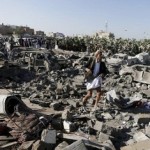The Saudi Arabian bombing on Yemen last week has revealed clearly the distortions in the wars in West Asia, all of them proxy battles for supremacy between the Saudis and the Iranians. The Saudi air strikes, which they claim was the result of a “direct request from the legitimate government of Yemen” ironically took place at the time that its ally, the US, struck at ISIS in Iraq, supporting an Iranian-led ground offensive. Deepening the contradictions, this week the Israeli Air Force has reportedly joined the Saudi offensive in Yemen.
The battle in Yemen is the newest face-off between Saudi Arabia and its Sunni allies and the Shias through the rebel Shia Houthis, who are believed to have some Iranian support. The Houthis took over the Yemeni capital of Sana’a, causing its President Abed Mansour Hadi, a Saudi ally, to flee, and provoking the Saudi action.
The open raids by Saudi Arabia – which has always operated through surrogates like the Taliban – has now clarified the underlying regional rivalries. Using its clout in the Gulf Cooperation Council (GCC), and by projecting the expansion of Iranian and Shia influence from Sana’s to Damascus, it has pulled together a Sunni ‘coalition’ of nine partners including the powerful trio of the United Arab Emirates, Bahrain and Qatar. It has also pulled Pakistan, a Saudi dependency, into ground combat.
For India, the involvement of Pakistan, has implications for its trouble-making role in Afghanistan and Jammu & Kashmir. The recent visit of the Qatari Emir to New Delhi, could have been to alert India on the deteriorating situation in Yemen – and perhaps to seek assurance from India to keep its western borders quiet. If the conflict persists, and the Pakistan army is involved in large numbers, it could reduce its ability to cause mischief in the subcontinent – a welcome respite in hostilities that would allow the PDP-BJP government in Jammu & Kashmir to settle down.
Pakistan, and particularly Prime Minister Nawaz Sharif, who spent a decade in exile in Jeddah, would have found it difficult not to yield to the Saudi demand. The Pakistani army has reportedly provided protection to Saudi monarchs for years. But it has not been in open military action in the West Asian theatre, an area inflamed by numerous conflicts – tribal, sectarian and nationalisms – where 2 million Pakistani workers make a living, and from where it gets it oil imports.
But more portentous could be the nuclear dimension. As the P5 + I nuclear talks with Iran approach the March 31 deadline, the latent wish of major Sunni countries in the region like Turkey, Egypt and Saudi Arabia for their own nuclear weapons programmes, will resurface.
The Saudis, who are believed to have funded the Pakistani nuclear programme, will re-open the speculation that Pakistani weapons will be available to it in short order. The Saudis have already called in their chips with other dependencies too – countries like Morocco, Sudan, Jordan and Egypt, which have received billions of dollars in Saudi support over the years. Since they all have large standing armies, as members of the 10-member Sunni coalition supporting the Saudi action, they will play a critical role in ground combat in Yemen.
There is also the energy dimension. The immediate global economic fallout to the Saudi move will be a spurt in oil prices. This is not a welcome outcome for oil-importing countries like India.
Pakistani participation in this conflagration will bring the country closer to its yearning to be a part of West Asia. After the creation of Bangladesh, Zulfikar Ali Bhutto began to push Pakistan towards a West Asian identity, to escape its Indian civilizational roots. That dream could now become a reality – unfortunately a reality of blood and tears.
This article was exclusively written for Gateway House: Indian Council on Global Relations. You can read more exclusive content here.
For interview requests with the author, or for permission to republish, please contact outreach@gatewayhouse.in.
© Copyright 2015 Gateway House: Indian Council on Global Relations. All rights reserved. Any unauthorized copying or reproduction is strictly prohibited


